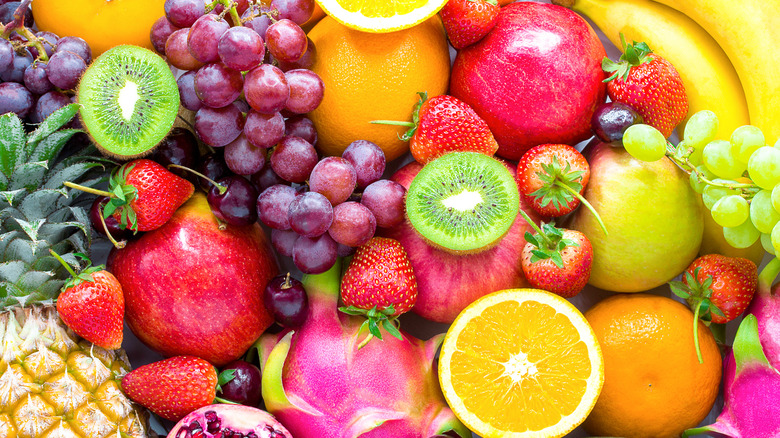If You Don't Feel Well After Eating Fruit This Could Be Why
Not feeling well after eating fruit could mean that you have an intolerance to the main sugar found in it: fructose (per WebMD). Fructose intolerance comes about in two ways: you were either born with it, making it a hereditary intolerance, or you have a dietary intolerance in which your body isn't efficient at absorbing fructose. The inability to properly break down and absorb fructose can lead to unpleasant long-term effects. In one 2001 study published in the Scandinavian Journal of Gastroenterology, researchers found that malabsorption of fructose can lead to a lack of tryptophan, an important chemical for regulating mood.
Most cases of hereditary fructose intolerance show up in infancy when babies begin weaning from breastmilk or formula to food (via WebMD). Those with this disorder do not produce the enzyme required to metabolize fructose, leading to blood sugar crashes and the build-up of toxins in the liver. Symptoms are typically overt and include vomiting, bloating, abdominal pain, jaundice, and an aversion to fruit or sweet foods.
When it comes to dietary fructose intolerance, the inability to break down the substance lies within the cells of the intestine, rather than a lack of a specific enzyme (per WebMD). This condition can come about later in life as a result of various causes, including stress, inflammation, and diseases, such as Crohn's and celiac. You'll experience bloating, gas, and stomachaches after eating fruit. Healthline points out that this condition affects one-in-three people, making it fairly common.
What can I eat and not eat if I have fructose intolerance?
If you are fructose intolerant, it's important to be mindful of what you consume in order to prevent discomfort and other unpleasant side effects. WebMD points out that it isn't enough to just avoid the obvious vessels for fructose (fruit) but to also pay attention to other products that might be hiding this sugar in their ingredient list. For example, you'll often find high fructose corn syrup in a number of different processed foods, including chips, cookies, crackers, candy, soda, juices, condiments, and even bread, as per Healthline. Certain vegetables also contain fructose, including zucchini, peas, mushrooms, and bell peppers.
The Mayo Clinic adds that you will need to keep an eye out for other sugary substances that may not obviously contain fructose. These include honey, agave, molasses, sorghum, maple-flavored syrup, and palm sugar. Fructose is also found in white, granulated table sugar.
You may be pleased to learn that cutting out all fruit from your diet isn't necessary if you're dealing with hereditary or dietary fructose intolerance (via WebMD). Certain fruits, such as berries, citrus fruits, avocados, bananas, and cantaloupe, are low in that particular sugar and likely won't cause you to feel unwell after consumption.
Since having a fructose intolerance eliminates many nutritious foods from the diet, it's important that you consult with a doctor or nutritionist to ensure that you are getting adequate nutrition from your diet.


